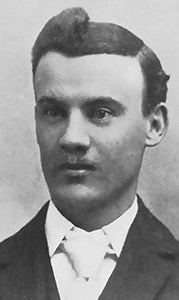The murder of Grac Jones: Chapter 2
Published 6:55 pm Monday, July 27, 2015

This is the main road leading into Holland from Suffolk. The road coming in from the left is now Dutch Road. Sam Hardy’s store is the two-story building on the left.
The will revealed
EDITOR’S NOTE: On the evening of Oct. 26, 1908, five shots rang out in the village of Holland. Tiberius Gracchus “Grac” Jones lay dying on the ground inside the gate leading to his home. “They have killed me and killed me for telling the truth,” he told a friend as his life ebbed away. This is the second in a series of articles about the Jones murder case. Suffolk historian Kermit Hobbs Jr. compiled the 18-part series from personal accounts, newspaper stories and court records he has studied from the period.
By Kermit Hobbs Jr.
In the early 1890s, Zach Holland hired young Sam Hardy as a clerk in his store in the town of Holland.
Sam was a handsome man, well educated and had shown considerable promise in his younger years. But according to some, it was because of Hardy’s wayward adolescence that the best job he could find in adulthood was that of a clerk in a Holland grocery store.
Whatever shortcomings Hardy had, he was single, very personable, and he enjoyed a particular popularity in the Holland community. Hardy was gifted with a pleasant singing voice and was a member of the choir in Holland Christian Church.
Hardy eventually bought an interest in Zach’s store, and in spite of their age difference, the two partners had worked well together. Zach had later sold his interest in the store.
Sometime around 1904, Zach Holland wrote his will, bequeathing his entire estate to young Gertie Vaughan, a cousin for whom he had a particular fondness. He gave her the sealed will to keep until his death, but her mother had insisted that she give it back after her marriage.
On Feb. 3, 1908, Gertrude Vaughan Smith handed the will back to “Uncle Zach” Holland. The dejected Zach took the will back to the store and cut open the seal to review what he had written. With him in the store was his former business partner, Sam Hardy.
As he read, Zach noticed out the front window that a wayward mule was eating from a bag of oats that was loaded in the back of the store’s wagon. Zach ran out to chase away the mule, leaving the will on the counter. In the few minutes Zach was outside, Sam Hardy read the details of Zach’s intentions regarding the disposition of his estate.
In it were bequests to various relatives and friends with, of course, the majority going to Miss Gertrude Vaughan. Most surprising was the revelation that the estate totaled more than $50,000, a staggering sum of money in the early 20th century. True to his word, Zach Holland had conspicuously excluded the descendants of his brother, William, from his bequests.
Having read the details of Zach Holland’s will as it lay open on the counter in Holland and Hardy’s grocery store, Hardy eagerly shared his newfound knowledge with his close friends. Among those friends was Tiberius Gracchus “Grac” Jones.
Grac Jones was a lifelong resident of the Holland community with deep family roots in the area. For generations his ancestors had farmed land just west of the town, and at 52 years of age, Jones had acquired land holdings of more than 400 acres. His property included both land under cultivation and virgin timberland. He had business ties with a number of other local businessmen.
Jones was a well-known figure in the community, but he was regarded by many as somewhat eccentric. The era of Prohibition was still several years in the future, but Jones was a strong supporter of the Temperance movement. He never consumed alcohol in any form, and he disapproved of its use by anyone else. He had a sense of morality that some people might have found excessive.
Jones and his wife, Martha, had one child, 10-year-old Mary. The family farm was on the north side of South Quay Road, just outside the village of Holland.
TOMORROW: Chapter 3 — The dispute






